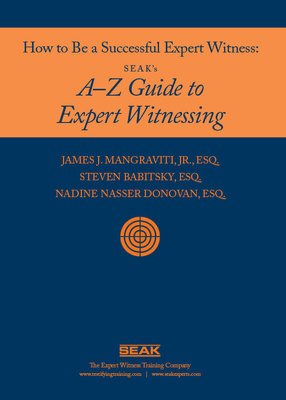Expert Witness Cross-Examination Questions And Areas of Inquiry
SEAK, Inc.
www.seak.com
Excerpted from the SEAK, Inc. text, The A-Z Guide to Expert Witnessing
©2006 SEAK, Inc.
FREE Whitepaper: The 21 Golden Rules of Testifying on Cross Examination
Expert Witnesses need to be effective when questioned by opposing counsel during cross-examination. Anticipating the areas of likely inquiry and preparing accordingly will increase an expert’s effectiveness. The following outline describes some of the most important lines of inquiry opposing counsel may follow.
Initial Consultation
__ When you were first contacted
__ By whom you were contacted
__ When you were retained
__ What you were requested to do
Qualifications
__ Accuracy of CV
__ Misleading information on CV
__ Knowledge
__ Skill
__ Education/Degrees/Licenses or lack thereof
__ Training
__ Extensive areas of expertise listed in CV, suggesting expert is expert in everything
__ Self serving characterizations in CV
__ Memberships in societies
__ Awards
__ Practical experience
__ Recentness of experience
__ Relevancy of experience
__ Credibility
__ Marketing activities
__ Relationship to retaining party or attorney
__ Affiliation with an insurance company
__ Conversations with retaining attorney
__ Indirect monetary interest
__ Prior testimony
__ Professional presentations
__ Professional and personal writings
__ Professional errors or miscues by expert
__ Information on web page
Opinions
__ Documents and pleadings reviewed
__ Validity of underlying facts
__ Validity of underlying assumptions
__ Conflicts with opinions of other experts
__ Notes on documents
__ Information expert failed to review
__ Time spent forming opinion
__ Sources of information
__ Reports of other experts reviewed
__ Your opinion’s foundation
__ Reliance on tests not personally performed
__ Reliance on other experts’ records
__ Reliance on self-reported history
__ Omitted facts
__ When you formed your opinions
__ Opinions you will be offering
__ Opinions you will not be offering
__ Prior contrary opinions
Fees and Billing
__ Hourly rate
__ Amount billed to date
__ Amount anticipate billing
__ Amount paid in prior cases by client
Forensic Work
__ Percentage of your time spent on forensic work
__ Amount for plaintiffs
__ Amount for defendants
__ Percentage of your total income derived from forensic work
__ Consulting work where not retained to testify
__ Marketing activity, including web pages
Bias
__ Impartiality
__ Inflexibility
__ Personal/social relationship with party/attorney
__ Professional witness
__ Advocate
__ Fees and compensation
__ Direct or indirect financial interest in the case
Reports
__ Dates of reports
__ Oral vs. written
__ Revisions
__ Information in report
__ Inaccuracy in reports
__ Preliminary vs. final
__ Additions, alterations, corrections
__ Prior drafts
Tests Performed
__ When, where, at whose request
__ Results
__ Equipment used
__ Similarity of conditions
__ Photos, videos, or sketches taken
__ Tests not performed
__ Accuracy of calculations, tests
Visit to Accident Scene
__ When and at whose request
__ Similarity of conditions
__ What was done during visit
Skeletons in Closet
__ Professional discipline
__ Loss of job
__ Failing certification exams
__ Criminal convictions
__ Suspension/revocation of licenses
__ Testimony rejected by other courts or administrative agencies
__ Findings of being not qualified to testify
__ Prior professional or testifying mistakes
Subpoenas
__ Fully complied with subpoena
__ Removed documents from your file
Learned Treatises
__ Which texts, treatises, and articles are authoritative
__ Contrary statements in treatises
Prior Testimony
__ One-sidedness
__ Inconsistencies (impeachment with prior testimony)
Legal Standards
__ Degree of probability required
__ Standards of practice
__ Pertinent statutes, rules, regulations, and codes
Daubert Issues
__ Has your technique or theory been tested?
__ Has your technique or theory been subject to peer review and publication?
__ The known or potential rate of error of the technique or theory
__ The existence of standards and controls
__ The degree to which the technique or theory has been generally accepted by the scientific community
__ Theory developed “for litigation only”

